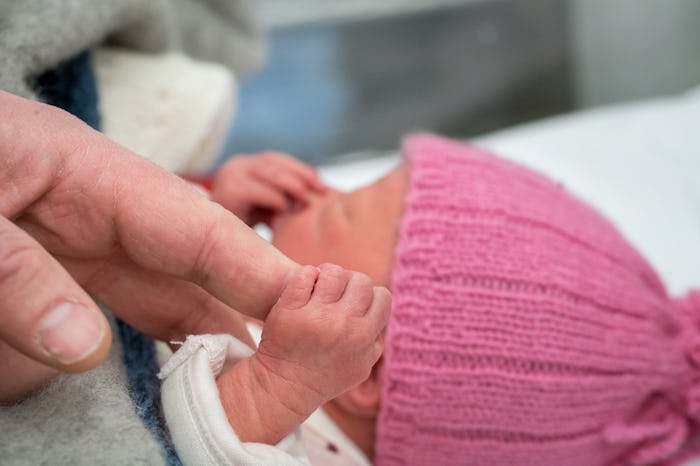Life

Your Baby Is Born Knowing How To Do These 6 Amazing Things
Babies, they’re just like us: They flinch when they’re startled and they flail around if dropped in water. Infants are born with reflexes, and you may be surprised by these six amazing things your baby instinctively knows how to do. For example, I’ll admit I was a bit disappointed when I found out that babies aren't wrapping their tiny palms around my finger because I’m their favorite person, but instead because it’s a natural instinct most commonly known as the “grasping reflex.”
The reasons babies have some of these instincts is a bit of a mystery. “We aren't exactly sure why they have these responses,” pediatrician Rob Darzynkiewicz M.D. tells Romper. “They are based on neurological development. You can guess that these instincts are rooted in survival. Perhaps these survival instincts were developed over time as babies needed to give certain signals and develop certain habits in order to survive.”
One thing’s for sure; while infants may seem vulnerable and defenseless (and of course, in many ways, they are) some of their instincts are actually quite sophisticated and designed to protect them from harm. For example, “if an object comes straight toward her, she’ll turn her head and try to squirm out of its way. (Amazingly, if the object is on a path that would make it a near miss instead of a collision, she will calmly watch it approach without flinching),” the American Academy of Pediatrics (AAP) explained. And interestingly enough, some things that seem instinctual, like laughing at peek-a-boo, are actually learned behaviors.
"Babies can begin to recognize emotion as they get older, but they are taught which things are good and bad, or happy and sad," Darzynkiewicz tells Romper. "Your baby won’t know instinctively if something is funny or happy, but after several months of observing you, they’ll begin to pick up on these trends." So if you want your baby to laugh a lot, make sure you laugh often too.
Read on for some of the amazing things your baby instinctively knows how to do, and be prepared to be wowed by baby superpowers.
1They Hold Their Breath
Babies have a natural response to being submerged in water. "My favorite amazing baby power is the diving reflex," pediatrician Dr. Jarret Patton (who goes by Doctor Jarret), tells Romper. "When a baby's face is submerged in water, they hold their breath, and start shutting down the blood flow to non-essential organs while slowing their heart rate. This amazing reflex helps keep a baby from getting milk in their lungs and can help them for a few seconds if they find themselves in a pool of water. This reflex, although not often used, can be life saving."
Babies also gulp air and briefly hold their breath if you blow in their face, which is an aspect of the same reflex and typically subsides when the baby is about 6 months old.
2They Try To Grab Onto Things When Startled
The "Moro Reflex" refers to a babies instinctual response to being startled. "If you lower their head a few inches quickly or if there’s a loud noise, they’ll thrust their arms and legs out (like they’re looking to grab onto something)," Darzynkiewicz tells Romper. It can be startling for you, too, to see your child react to being startled, but if you know your baby's intense knee-jerk reaction is an innate biological response, you may be able to appreciate how cute it is.
3They Recognize Your Smell
"Babies can identify their parents by smell at birth," Darzynkiewicz tells Romper. In fact, they actually may know their mother's scent before birth, and babies, "recognize and prefer the smell of their own mother’s body odor and breast milk, even within the first few days after birth," pediatrician and neonatologist Dr. Jessica Madden M.D. said in an earlier Romper article.
4Mouthing Reflexes
Considering babies have to use their mouths to stay alive, it makes sense that many of the things they know how to do instinctually involve the mouth. Babies have a natural inclination to suck (no offense, babies) on pacifiers or nipples. "Mouthing reflexes help with breastfeeding," Darzynkiewicz says. "For example, if you stroke a baby’s cheek, it will turn toward your touch with an open mouth, as if rooting for a nipple." Like all humans, they also have a gag reflex which helps protect them from choking.
5Stepping Or Dancing
Before you start telling people you think your baby will be an early walker, it's good to know that all babies have what's known as a "stepping reflex." This is sometimes sweetly called the "dancing reflex" because it looks like your little one is doing a little jig. If you hold them upright with two feet flat on the ground, they will instinctively lift one foot, then the other. This will typically stop happening when the babe is around 2 months old, per Verywell Family.
6Holding Onto Things
There are few things sweeter than an infant wrapping their little hand around your finger or that of their big sibling and holding tight (in fact, you may have to gently open their fist to get them to let go). They have a similar instinct with their feet too, known as the "plantar grasp reflex." The hand grasp reflex lasts until the baby is about 5 to 6 months old, and the foot reflex can happen up until they're a year old, per Stanford Children's Health.
Experts:
Dr. Rob Darzynkiewicz, Chief Medical Officer of Hazel Health
Dr. Jarret Patton pediatrician and author of Whose Bad @$$ Kids Are Those?